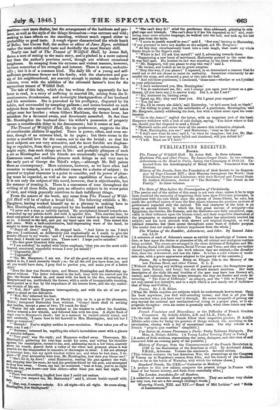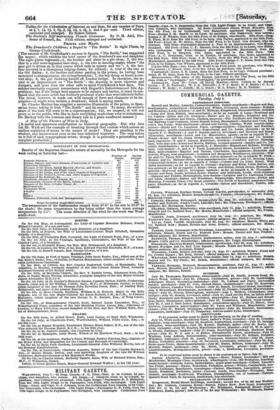The State of Man before the Promulgation of Christianity.
[The precise end of the author of-this essay is not very clear, unless it be to urge upon mankind the necessity of improving their laws upon Christian principles, in compliance with the rule which since the advent of Jesus Christ, he says, has made the spiritual nature of man the first objeciovhereas the previous systems of government regarded only the animal. The real character of the book is an essay on ancient history, in which the four great nations of antiquity—the Egyptians, the Greeks, the Romans, and the Hebrews—are fully considered, especially in their influence upon the human mind, and their respective illustration of the progressive or stationary principle. The author has attentively studied his subject; and his book abounds with shrewd and original thoughts, as well as tolerant remarks; but there seems throughout some want of definite purpose. The reader does not realize a distinct impression from the whole.] The Wisdom of the Rambler, Adventurer, and Idler. By Samuel Johnson, LL.D.
[A selection of such of Johnson's essays as exhibit his knowledge of human MItare, or bear upon the duties or pleasures of life all critical and analogous matters being avoided. The essays are arranged in the three divisions of Religions and Mo
ral Duties, Social Life and Mannees, Social Virtues and Vices; and they are further classed together according to the work whence they are derived,—the Rattabkr first, then the Adventurer, and last the Idler. It forms a solid volume of mode rate size with a grave appearance adapted to the gravity of the contents.]Poirws. By a Sempstress. Being an Elegaie Ode to the Memory of the
late Thomas Hood, and other Poems. E. L. E.
'Without displaying any striking amount of poetical power, the Sempstress sesses taste, fluency, and fancy; but she should discard ambition. Her tales descriptive of the dailylife and troubles of the poor may have less literary art, variety, and richness, than her larger attempts, but they are fresher and more Interesting. "The Fate of Diffidence" an allegory, and the "Ode to Fancy," WO not only unreal but imitative, and in a style which is now neatly out of fashion— that of Gray and Collins.] Poems. By J. H. Rare. [What Mr. Rohm requires are subjects which he understands how to treat. Open his book anywhere, you find well-sounding verses; and that is all you will have reached when you have read it through. He seems incapable of getting mat amp beyond the external and mechanical—of rising to a proper plan, or to appropriate thoughts: even his metre is generally unht, when there exists any meson for choicel French Feminines and bfasculines; or the Difficulty of French Genders Conquered. By Achille Albites, A.B. and LL.B., Paris, &c.
[To the rule that male and female follow their respective genders M. Achille Mlites adds rules for fixing the genders of things without life, according to the termination, closing with a list of exceptional cases. The tiny volume is a French " propria qum maribus" simplified.]
line Soirée de Jeunes Personnes a Paris: Petits Tableaux Dialogues. Tar Mme. A. Delaye Albites. (A Young Ladies' Evening Party in Paris.) [A series of little sections, representing the notes, dialogues, and chit-chat Oland connected with an evening party of the youthfuL] History of Europe, from the Commencement of the French 'Revolution in 1789 to the Restoration of the Bourbons in 1815. By Archibald Alison, F.R.S.E., Advocate. Volume the nineteenth. Seventh edition. [This volume contains the last American War, the proceedings at the Conga= of Vienna up to Napoleon's evasion from Elba, and the history of the Hundred Days so far as the battle of Waterloo, with which the volume closes.] Standard Novels, No. C2111—" Catherine de Medicis."
[A preface to this new edition compares the present doings in France with those of her former history, and finds them essentially alike.] The London Anecdotes/or all Readers.
[A collection of anecdotes about popular authors. They aie neither very choice nor very rare, but are a fair enough shilling's worth.] Waoerley Novels, MIL and XIV.—" Heart of Mid Lothian" and "Bride of Lammermoor." Tables for the Cakulation(Interest, on any Sum, for any number of Days, at *, 1, 1*, 1*, 2, 2*, 3„ 33, 4, 4*, 5, and 6 per cent. Third edition, corrected and enlarged. y Robert Gilmer. The Student's Self-instructing French Grammar. By D. M. Aird, Professor of French, &e. Fifth edition, enlarged and corrected.
PRINTS AND MAPS.
The Drunkard's Children; a Sequel to "The Bottle." In eight Plate's, by George Cruikshank. [The success of Mr. Cruikshank's sermon in figures, "The Bottle," has suggested the sequel; which exhibits the brief career of the drunkard's son and daughter. The eight plates represent-1, the brother and sister in a gin-shop; 2, the brother in a still more degraded beer-shop; 3, the two in dancing-reems, where "the poor girl is driven on in that course which ends in misery and wo "; 4, the brother arrested in a threepenny lodging-house, for robbery; 5, trial of the two at the Old Bailey; 6, the brother and sister parting in the prison, he having been sentenced to transportation she to imprisonment; 7, the boy dying on board a convict ship; 8, the girl throwing herself off London bridge. In execution, the sequel is an improvement on "The Bottle ": the drawing is more vigorous and compact, and more than the other calls to mind Cruikshank's best days. The subject inevitably suggests comparisons with Hogarth's Industrious and Idle Apprentices; but if the design here appears to be meagre and barren, it must be confessed that the same artist has formerly produced works that were infinitely fuller. The moral, however, is made out with enough of force and character to be im • pressive-it might even reclaim a drunkard; which is saying much. Dr. Charles Mackay has supplied a narrative illustrative of the prints, in S.penserian verse; taking m both' The Bottle and its sequel. To many, the writer's share of the task will seem to be a supererogation; but, we suspect, 6t will not prove so to the public, who like to have everything made clear even to minuteness. Dr. Mackay tells the common and dreary tale in a plain unaffected manner.] Map of the Theatre of War in Daly.
[A useful and opportune contribution to historical geography. But why does not Mr. Wyld set the example of breaking through that custom which causes an endless repetition of errors in the names of maps? They are puzzling to the student, and inconvenient even to the best-informed inquirers. 'The map before us is full of such typographical errors; though it is generally a painstaking and complete production.]



























 Previous page
Previous page